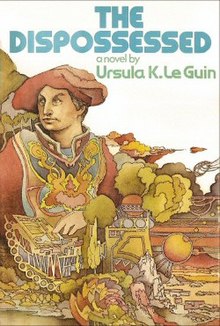Dispossessed

Cover of first edition (hardcover)
|
|
| Author | Ursula K. Le Guin |
|---|---|
| Cover artist | Fred Winkowski |
| Country | United States |
| Language | English |
| Series | The Hainish Cycle |
| Genre | Science fiction |
| Published | 1974 (Harper & Row) |
| Media type | Print (Hardcover and Paperback) |
| Pages | 341 (first edition) |
| Awards | Locus Award for Best Novel (1975) |
| ISBN | (first edition, hardcover) |
| OCLC | 800587 |
| Preceded by | The Word for World is Forest |
| Followed by | Four Ways to Forgiveness |
The Dispossessed: An Ambiguous Utopia is a 1974 utopian science fiction novel by Ursula K. Le Guin, set in the same fictional universe as that of The Left Hand of Darkness (the Hainish Cycle). The book won the Nebula Award for Best Novel in 1974, won both the Hugo and Locus Awards in 1975, and received a nomination for the John W. Campbell Memorial Award in 1975. It achieved a degree of literary recognition unusual for science fiction works due to its exploration of many themes, including anarchism and revolutionary societies, capitalism and individualism and collectivism.
It features the development of the mathematical theory underlying the fictional ansible, an instantaneous communications device that plays a critical role in Le Guin's Hainish Cycle. The invention of the ansible places the novel first in the internal chronology of the Hainish Cycle, although it was the fifth Hainish novel published.
The Dispossessed is set on Anarres and Urras, the twin inhabited worlds of Tau Ceti. Cetians are mentioned in other Ekumen novels and short stories. An Anarresti appears in the short story The Shobies' Story. Urras before the settlement of Anarres is the setting for the short story "The Day Before the Revolution".
In The Dispossessed, Urras is divided into several states and dominated by the two largest ones, which are rivals. In a clear allusion to the United States (represented by A-Io) and the Soviet Union (represented by Thu), one has a capitalist economy and patriarchal system and the other is an authoritarian system that claims to rule in the name of the proletariat. Further developing the analogy, there are oppositional left-wing parties in A-Io, one of which is closely linked to the rival society Thu, as were communist parties in the US and other Western countries at the time the story was written. Other parties represent various dissident visions of socialism. Where the situation differs from that of 20th century Earth is the existence of the anarcho-syndicalist world Anarres, representing a third ideological alternative - however, its influence is weakened by most Odonians having agreed generations ago to go into exile on a different world and cut themselves off. There are still some Odonians in A-Io, who eventually contact the Anarresti protagonist Shevek with a note chiding him for betraying his beliefs by working at the university and accepting the government's hospitality. Beyond that, there is a third major, though underdeveloped, area called Benbili—when a revolution supported by Thu breaks out there, A-Io invades, generating a proxy war. Although there are a wide variety of parties in A-Io, there are no political parties on Anarres. An Odonian orthodoxy prevails without any overt enforcement or oppression, although free thinkers who go too far can end up in psychiatric institutions, as happens with Shevek's childhood friend, Tirin.
...
Wikipedia
